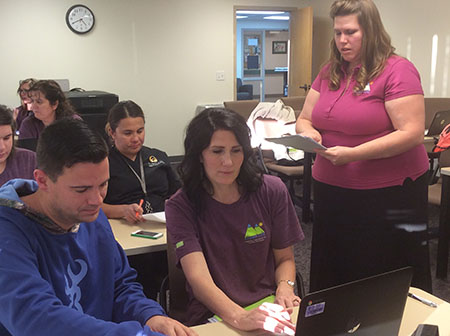WSU’s ‘Project LIFE’ Educates Drug Court Participants
OGDEN, Utah – A new literacy program through Weber State University provides individualized tutoring to drug offenders with the goal of helping them complete their high school equivalency test (GED) and prepare for post-secondary education at WSU or at a Utah College of Applied Technology (ATC) institution.
Those who successfully complete the program receive a $500 scholarship that may be used at WSU, the Ogden/Weber ATC or the Davis ATC.
Second District Court Judge Mark DeCaria suggested to WSU that many drug court offenders have literacy challenges. Deficient reading and writing skills limit their ability to find meaningful employment. Without work, the opportunity to turn their lives around is difficult.

LIFE students learn as Gina Shelley, far right, instructs.
WSU’s director of the Center for the Study of Poverty and Economic Inequality, Mike Vaughan, approached Gina Shelley, an assistant professor of teacher education, to develop a literacy program for Ogden City drug court participants.
Shelley created Project LIFE (Literacy Instruction to Further Education). She spent the summer researching and developing curriculum and then recruited seven drug court participants and seven Weber State student tutors all majoring in education. They meet together once a week to work on reading, writing, computer literacy and math.
“I’m used to working with different reading levels but usually within a range,” Shelley said. “Here the lowest reading level is 4th grade and the highest is 12th. That’s huge. It’s like teaching in a one-room classroom and trying to figure out how to design curriculum that is not boring — that will engage as well as be something at the students’ interest levels that offers choice, but isn’t too difficult. It’s a huge challenge.”
Nearing the end of the program’s first semester, four participants have applied to OWATC and one to Weber State. Three students are preparing to take the GED.
“This program has given students the motivation to continue with their education because they have had such negative educational experiences in the past,” Shelley said. “Many of them haven’t been in school for a decade, and they have very, very low self-worth; the idea of earning their GED or starting college all by themselves is overwhelming.”
To meet individual learning requirements, each student is assigned one tutor to work with per class period. All of the tutors are enthusiastic, and most plan to continue with Project LIFE, but for Timberly Cackler the program is personal. She graduated from drug court in August 2014. She knows how much second chances and education can change an individual.
“Drug court saved my life,” Cackler said. “I wasn’t going to be able to teach with a drug conviction. I had to spend a year proving myself in drug court in order to have my charge dismissed. I am grateful for the skills and chance it gave me.”
Cackler will graduate from Weber State in spring, and with permission of the State Office of Education be able to fulfill her lifelong goal of becoming a teacher. She has a lot of empathy for the students in Project LIFE who want to make a change.
Shawn Batey is one who attends class every week, and for the first time in his educational experience, sits on the front row. He has a full-time job, is enrolled at the DATC, is reading his first book in three years, and said he spent Thanksgiving sober with his family for the first time in 17 years.
Batey moved to Utah in 2012 because his bunk mate in a Florida prison described a vivid picture of the Wasatch Front, and Batey had never seen mountains.
His optimistic plans for a new life here derailed, however, and Batey was quickly involved in drugs.
“Drug dealers are always there with open arms waiting for you to come in,” he explained. “That just started a spiral down until I was homeless, eating out of trash cans, stealing clothes, anything I could do to try to keep warm. I knew which restaurants to go to after they closed to get the best foods out of their dumpsters.”
While in jail, Batey accepted the opportunity to enroll in drug court, which offers a one-time chance at treatment and rehabilitation in lieu of lockup. Participants have to prove they have made significant positive changes in their lives. Project LIFE is one of the many program options for offenders.
Shaila Baker has participated in several programs that are helping her stay busy and away from drugs, but Project LIFE helped her get back to school. She is registered for spring semester classes at Weber State and plans to study business.
“When I was using, I kind of fell off the whole academic scale,” Baker said. “I was in college but stopped going to school. Dr. Shelley and my tutor got me back on track and got my mindset back on the academic process to do what it takes to get back in school.”
Baker said now she is reading and doing homework again. While she studies, her elementary-school son sits beside her and does his homework.
“Our Project LIFE participants don’t have positive role models in their lives,” Shelley said. “Many don’t know anyone who is a college graduate or has a successful career, so everywhere they turn, they see boundaries. They lack the role models most of us take for granted. In our class, they report each week and say ‘Look at all I’ve done. I’ve done everything you’ve asked,’ and it’s really inspiring.”
Visit weber.edu/wsutoday for more news about Weber State University.
Allison Barlow Hess, Director of Public Relations
801-626-7948 • ahess@weber.edu- Contact:
Gina Shelley, Project LIFE director
801-626-6523 • ginashelley@weber.edu